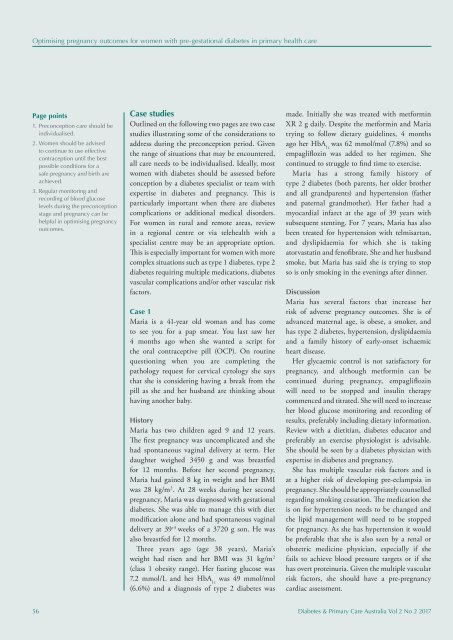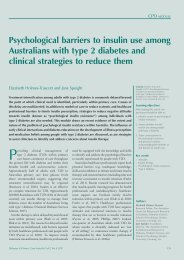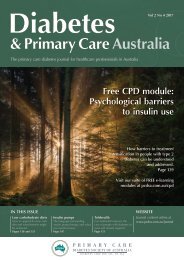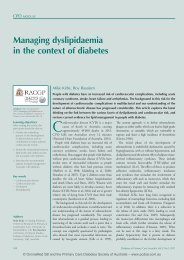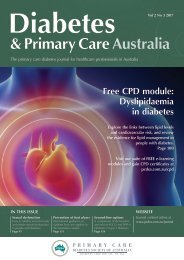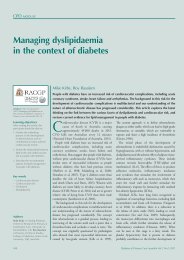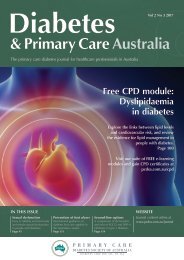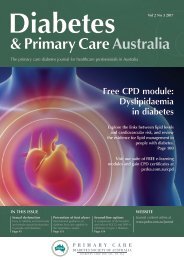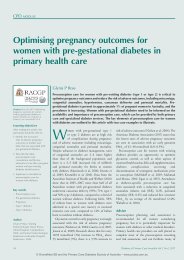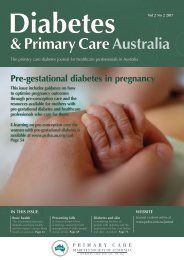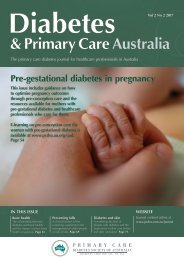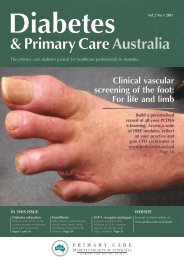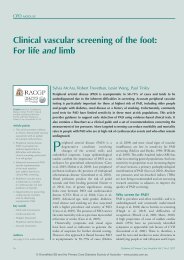DPCA2-2_issue_v3
You also want an ePaper? Increase the reach of your titles
YUMPU automatically turns print PDFs into web optimized ePapers that Google loves.
Optimising pregnancy outcomes for women with pre-gestational diabetes in primary health care<br />
Page points<br />
1. Preconception care should be<br />
individualised.<br />
2. Women should be advised<br />
to continue to use effective<br />
contraception until the best<br />
possible conditions for a<br />
safe pregnancy and birth are<br />
achieved.<br />
3. Regular monitoring and<br />
recording of blood glucose<br />
levels during the preconception<br />
stage and pregnancy can be<br />
helpful in optimising pregnancy<br />
outcomes.<br />
Case studies<br />
Outlined on the following two pages are two case<br />
studies illustrating some of the considerations to<br />
address during the preconception period. Given<br />
the range of situations that may be encountered,<br />
all care needs to be individualised. Ideally, most<br />
women with diabetes should be assessed before<br />
conception by a diabetes specialist or team with<br />
expertise in diabetes and pregnancy. This is<br />
particularly important when there are diabetes<br />
complications or additional medical disorders.<br />
For women in rural and remote areas, review<br />
in a regional centre or via telehealth with a<br />
specialist centre may be an appropriate option.<br />
This is especially important for women with more<br />
complex situations such as type 1 diabetes, type 2<br />
diabetes requiring multiple medications, diabetes<br />
vascular complications and/or other vascular risk<br />
factors.<br />
Case 1<br />
Maria is a 41-year old woman and has come<br />
to see you for a pap smear. You last saw her<br />
4 months ago when she wanted a script for<br />
the oral contraceptive pill (OCP). On routine<br />
questioning when you are completing the<br />
pathology request for cervical cytology she says<br />
that she is considering having a break from the<br />
pill as she and her husband are thinking about<br />
having another baby.<br />
History<br />
Maria has two children aged 9 and 12 years.<br />
The first pregnancy was uncomplicated and she<br />
had spontaneous vaginal delivery at term. Her<br />
daughter weighed 3450 g and was breastfed<br />
for 12 months. Before her second pregnancy,<br />
Maria had gained 8 kg in weight and her BMI<br />
was 28 kg/m 2 . At 28 weeks during her second<br />
pregnancy, Maria was diagnosed with gestational<br />
diabetes. She was able to manage this with diet<br />
modification alone and had spontaneous vaginal<br />
delivery at 39 +3 weeks of a 3720 g son. He was<br />
also breastfed for 12 months.<br />
Three years ago (age 38 years), Maria’s<br />
weight had risen and her BMI was 31 kg/m 2<br />
(class 1 obesity range). Her fasting glucose was<br />
7.2 mmol/L and her HbA 1c<br />
was 49 mmol/mol<br />
(6.6%) and a diagnosis of type 2 diabetes was<br />
made. Initially she was treated with metformin<br />
XR 2 g daily. Despite the metformin and Maria<br />
trying to follow dietary guidelines, 4 months<br />
ago her HbA 1c<br />
was 62 mmol/mol (7.8%) and so<br />
empagliflozin was added to her regimen. She<br />
continued to struggle to find time to exercise.<br />
Maria has a strong family history of<br />
type 2 diabetes (both parents, her older brother<br />
and all grandparents) and hypertension (father<br />
and paternal grandmother). Her father had a<br />
myocardial infarct at the age of 39 years with<br />
subsequent stenting. For 7 years, Maria has also<br />
been treated for hypertension with telmisartan,<br />
and dyslipidaemia for which she is taking<br />
atorvastatin and fenofibrate. She and her husband<br />
smoke, but Maria has said she is trying to stop<br />
so is only smoking in the evenings after dinner.<br />
Discussion<br />
Maria has several factors that increase her<br />
risk of adverse pregnancy outcomes. She is of<br />
advanced maternal age, is obese, a smoker, and<br />
has type 2 diabetes, hypertension, dyslipidaemia<br />
and a family history of early-onset ischaemic<br />
heart disease.<br />
Her glycaemic control is not satisfactory for<br />
pregnancy, and although metformin can be<br />
continued during pregnancy, empagliflozin<br />
will need to be stopped and insulin therapy<br />
commenced and titrated. She will need to increase<br />
her blood glucose monitoring and recording of<br />
results, preferably including dietary information.<br />
Review with a dietitian, diabetes educator and<br />
preferably an exercise physiologist is advisable.<br />
She should be seen by a diabetes physician with<br />
expertise in diabetes and pregnancy.<br />
She has multiple vascular risk factors and is<br />
at a higher risk of developing pre-eclampsia in<br />
pregnancy. She should be appropriately counselled<br />
regarding smoking cessation. The medication she<br />
is on for hypertension needs to be changed and<br />
the lipid management will need to be stopped<br />
for pregnancy. As she has hypertension it would<br />
be preferable that she is also seen by a renal or<br />
obstetric medicine physician, especially if she<br />
fails to achieve blood pressure targets or if she<br />
has overt proteinuria. Given the multiple vascular<br />
risk factors, she should have a pre-pregnancy<br />
cardiac assessment.<br />
56 Diabetes & Primary Care Australia Vol 2 No 2 2017


